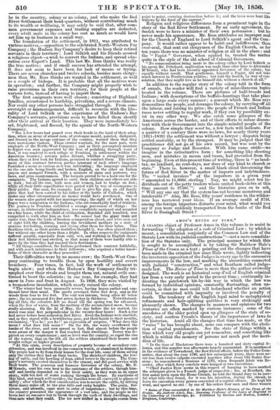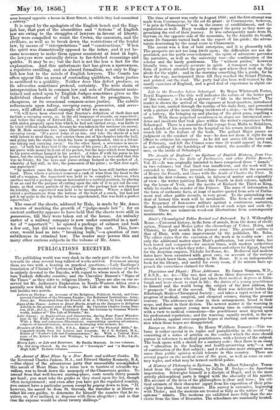AMOS'S RUINS OF TIME. * A LEADING object of Professor Amos
in this volume is to assist in forwarding " the adoption of a code of Criminal Law ; by which is meant, a consolidation conjointly of the Common Law and of the Statute Law with its judicial constructions "—not a mere consolida- tion of the Statutes only The principal manner by which this is sought to be accomplished is by taking Sir Matthew Hale's Pleas of the Crown as a text ; pointing out the changes that have been made in the criminal law since Hale wrote, lightly indicating the inveterate opposition of the Judges in every age to the successive improvements in the law, and marking the absurdities connected. with judicial "construction," and what Bentham called ju made law. The _Ruins of Time is more than the author avowedly designed. The work is an historical coup d'ceil of English criminal law from a very early period to the present time ' • continually in- dicating the patchwork bit-by-bit way in which the law was formed by individual opinions, constantly. fluctuating, often un- certain, so that no man could tell beforehand whether an action could be committed with impunity or involved the penalty of death. The tendency of the English legal mind to metaphysical refinements and hair-splitting cluibbles is very strikingly and pleasantly shown. The changes in manners and opinions for two centuries are often marked by curious instances ; some of the anecdotes of the older period open up glimpses of the state of so- ciety, and confirm Froude's theory of the importance of laws to the historian. Amid all the changes that time has made, or the " ruins " he has brought about, none can compare with the aboli- tion of capital punishments. See the state of things within a time which very old people can yet remember, and something like which is within the memory of persons not much past the meri- dian of life.
" In the time of Blackstone there were a hundred and sixty capital fe- lonies, and this number was afterwards largely augmented. It is mentioned in the evidence of Townshend, the Bow Street officer, before the Police Comb mittee, that about the year 1780, and few subsequent years, there were ne- ver less than twelve culprits executed together after every Old Bailey Ses- sions ; he remembered a Sessions of 1783, when Sergeant Adair was Re- corder after which forty convicts were hanged at two executions.
" Chief Justice Eyre seems in this respect of hanging to have merited the sobriquet given to a French judge of coupe-tete ; for, at Hertford, the first assize town upon the Home Circuit„ he told the Grand Jury to be care- ful what bills they found, for it was his intention, during the eircuit„ to leave for execution every person convicted of a capital offence. He kept his word, and spared no one : by one of his orders four men and three women • Ewan of Time exemplified in Sir Matthew Hale's History of the Pleas of the .Orsini. By.Andreso Amos, Esq., Downing Professor of the Laws of England in the Universal of Cambridge, iye, Published by Stevens and Norton, London;
Deighton, essablidge. were hanged opposite a house in Kent Street, in which they had committed a robbery."
It is urged by the apologists of the English bench and the Eng- lish bar, that part of the absurdities and " fictions" of English law are owing to the struggles of lawyers in favour of liberty. Thvy were compelled to resist the Crown, the canonists, and the . . . ans, as well as to break down the restrictions of the feudal law, by means of " interpretations " and "constructions." When the spirit was diametrically opposed to the letter, and it yet be- came necessary to make them appear consistent at least in logic, the lawyers were naturally driven to far-fetched reasonings and. quirks. It may be so ; but the fact is not the less a fact for the explanation. And this unfortunate fact has given a narrowness, a repulsive cavilling, and an absurd formalism, not only to Eng- lish law but to the minds of English lawyers. The Courts too often appear like an arena of contending quibblers, where justice is sacrificed to a quiddity. Neither does this defect produce, as its advocates sometimes pretend, certainty. The wide claim of interpretation both in common law and acts of Parliament main- tained and acted upon by English Judges sometimes gives us the individual character of Cath law, without its promptness, its cheapness, or its occasional common-sense justice. The subtile refinements upon taking, carrying away, possession, and sever- ance, will afford a small example of what we mean. "It will have been observed that Bracton's definition of theft does not include a carrying away, or, in the old language of records, an asportarit ; and before the reign of Edward III., it would appear that a thief detected with stolen property upon him which he had not carried away, was liable to be tried without indictment, because he was taken in the mainour (in menu). Sir M. Hale mentions two cases illustrative of what is and what is not a carrying away. 'If a guest lodge at an inn, and take the sheets of a bed with intent to steal them, and carries them out of his chamber into the hall, and going into the stable to fetch his horse is apprehended, this is a feloni- ous taking and carrying away.' On the other hand, a severance is neces- sary. 'A hath his keys tied to the strings of his purse; .B, a cut-purse, takes his purse with money in it out of his pocket, but the keys which were hanged to his purse-strings hanged in his pocket. A takes B with his purse in his hand, but the string hanged to his pocket by the keys : it was ruled that this was no felony, for the keys and purse-strings hanged in the pocket of A, whereby A had still, in law, the possession of his purse ; so that 'Wet cepit, non asportavit.' "In modern cases the doctrine of asportavit has been still further subti- lized. Thus, where a prisoner removed a cask of wine from the head to the tail of a waggon, the asportacit was held to be complete ; whereas, when another moved a package from an horizontal to a vertical position, by placing 'it on an end for the purpose of cutting open the side of it to get out its con- tents, so that every particle of the surface of the package had not changed its locality, the asportavit was held to be incomplete. Where a thief had raised a portmanteau from the bottom of the boot of a coach, but had not 'got it up quite to the top before he was apprehended, this was held a perfect asportation."
The case of the sheets, adduced by Hale, is made by Mr. Amos a means of marking the growth of " judge-made law" ; for an ancient authority appears to have held that the sheets were still in possession, till they were taken out of the house. An unlucky carter of a railway company is now under committal in a mat- ter of " asportavit " : he opened a package of salmon and took a few out, but did not remove them from the cart. This, how- ever, would lead us into " breaking bulk,"—a question of rare subtileness in criminal law. The reader may peruse this and many other curious subjects in the volume of Mr. Amos.



























 Previous page
Previous page